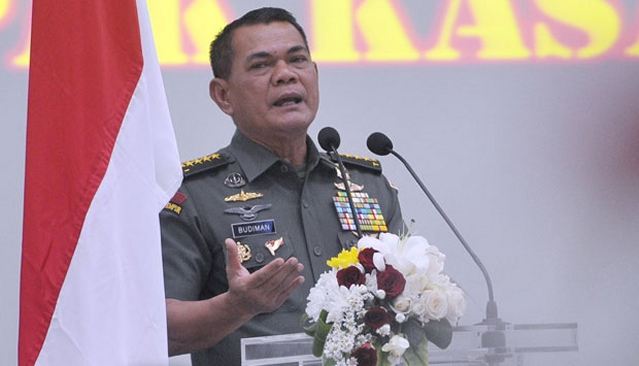Breaking news
Army and Surya University of Indonesia work together to develop new weapon technologies 0904141.
| a | |||
Defence & Security News - Indonesia |
|||
| Wednesday, April 9, 2014 10:14 AM | |||
| Army and Surya University of Indonesia work together to develop new weapon technologies. | |||
| The Army and Surya University of Indonesia are working together to develop 15 weapon technologies to reduce dependency on other countries for weapon acquisitions. The Indonesian Army chief of staff Gen. Budiman said the weapon development started six months ago and included nano-satellite, gyrocopter, unmanned aerial vehicle (UAV) or drone, laser-based firing simulation and GPS tracking system or automatic package reporting system (APRS). |
|||
| |
|||
 Indonesian Army Chief of Staff (KASAD), General TNI Budiman. |
|||
| “We could save a lot of state funds by producing our own [weapon systems]. We encourage soldiers to develop and expand upon the outcomes,” Budiman was quoted as saying by kompas.com on Monday during a ceremony to launch the research outcomes at Army headquarters. Budiman said that one advantage of developing our own weapon system was that prices would be relatively lower. He pointed out that the locally made GPS tracking system APRS cost only Rp 5 million (US$442.28) while imported ones could reach Rp 500 million each, meaning that huge savings could be made by producing the system at home. Another benefit of domestic production was minimizing the possibility of weapon systems being wire-tapped as well as avoiding the acquisition of overpriced weapons that were of a lower quality. “The risk of buying from another country is that the best weaponry is kept by the producing country. The second layer is offered to its allies while the third layer is sold to us,” Budiman said. Meanwhile, Surya University rector and founder Yohanes Surya said the university welcomed the Army’s intention of developing its own weapon systems. He said that only 13 Indonesian weapon technologies had obtained international patents in 2010. The number was a far cry from South Korea with 10,446 patents, China (16,403) and the US (48,896). Surya said Indonesia had a lot of experts in various technologies, but they chose to work abroad because the government did not give them due attention. “Take the research in nano-satellite for example. We have great experts who are on a par with those in other countries,” Surya said. |
|||



















